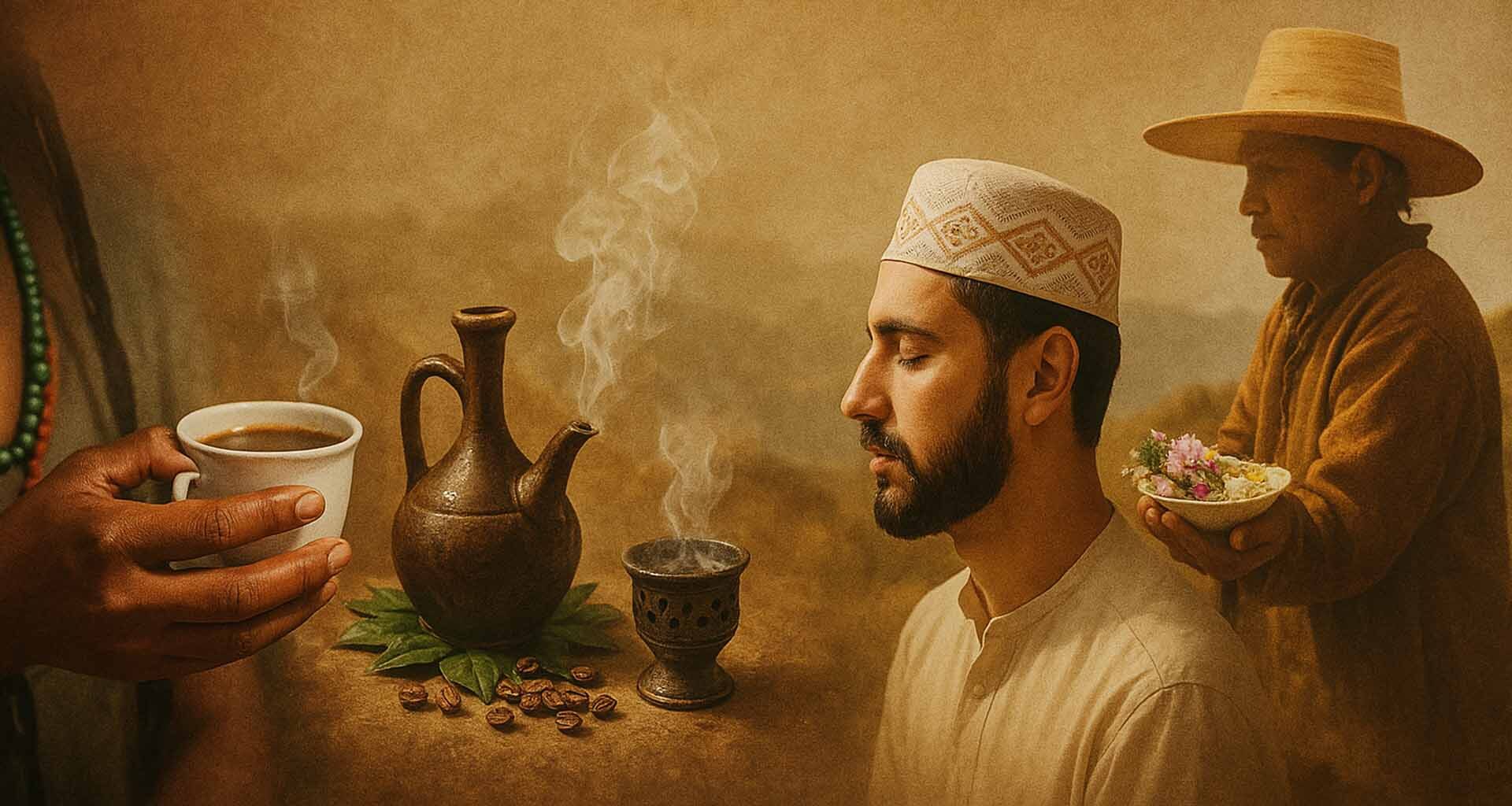Coffee Blessings, Rituals, and Superstitions

Table of Contents
Coffee is more than just a drink—it’s a global ritual, a cultural anchor, and in many places, a sacred experience. Across continents, coffee has long been intertwined with blessings, spiritual practices, and deep respect for the land and those who tend it. In exploring the spiritual and cultural dimensions of coffee, we find that a simple cup holds much more than flavor—it carries legacy, community, and ritual.
Ethiopia: Where Coffee Begins
In the highlands of Ethiopia, coffee is more than a crop—it’s a cultural heartbeat. Legend speaks of Kaldi, a goatherd whose goats became lively after eating bright red berries. This tale, part myth and part origin story, reflects how deeply coffee is rooted in Ethiopian identity.
The Ethiopian coffee ceremony remains a central tradition. Fresh beans are hand-ground, roasted over a flame, and brewed in a clay pot known as a jebena. The ceremony unfolds in three rounds—abol, tona, and baraka, the final cup symbolizing “blessing.” Incense fills the air, inviting positive spirits and setting a tone of reverence. Serving coffee in this way is an act of hospitality, respect, and spiritual connection—an everyday ritual that brings people together with purpose.
Honoring the Earth in the Andes
In Peru, Bolivia, and Ecuador, coffee cultivation is intertwined with Indigenous traditions. Farmers regularly make offerings to Pachamama, the Earth Mother, in a ritual known as a despacho. These offerings, placed carefully on the ground, may include coca leaves, corn, sugar, and a handful of coffee cherries.
Led by yatiris—traditional spiritual leaders—these ceremonies ask for blessings: protection from pests, favorable weather, and a generous harvest. Coffee is viewed not merely as an economic product, but as a sacred gift that must be honored. Each planting and harvest is both a labor and a prayer.
It’s a truth we’ve witnessed firsthand. At Alpen Sierra Coffee, we recently returned from a journey to Peru, where we spent time with smallholder farmers and communities who treat coffee not simply as commerce, but as spiritual stewardship. Participating in these moments—witnessing the reverence for Pachamama and the role of coffee in communal well-being—reminds us why we go to origin: to learn, to respect, and to support those who hold coffee’s deepest traditions. Through ongoing partnerships, including projects like Café Femenino, we strive to carry this spirit forward in every roast. Our commitment to ethical sourcing and long-term impact is further reflected in our
Sustainable Coffee Guide,
deepened by face-to-face connections through our
Direct Trade Relationship Coffee model,
and upheld even amid price pressures, as detailed in our
On the Rise post.
Indonesia: Where Spirits and Crops Meet
Indonesia’s spiritual landscape is a rich blend of animist traditions and Islamic beliefs, and its coffee culture reflects that duality. Before planting new crops or opening a processing station, farmers often hold blessings. Local imams may be invited to recite prayers over the land.
There’s also a deep respect for the natural world. Many farmers believe that spirits inhabit the forests and fields. It’s common to ask these spirits for permission to harvest or to offer gratitude after a successful season. In some regions, roasting is done in silence—a quiet act of reverence for the bean’s transformation.
Central America: Blessings from Saints and Soil
In Catholic-influenced countries like Guatemala and El Salvador, farmers blend religious tradition with coffee production. Before harvest begins, a priest might bless the land and the laborers, asking for health, safety, and abundance.
Festivals in rural areas often honor patron saints of agriculture. Wooden crosses or religious icons are placed near coffee drying beds, thought to ward off storms, pests, or bad fortune. These rituals are heartfelt gestures of faith and gratitude, mixing Christian devotion with localized agricultural beliefs.
Haiti: Coffee and Vodou
In Haiti, spiritual life often merges with agriculture through Vodou traditions. Coffee plays a role in offerings made to loa, spirits that govern natural elements like rain, fertility, and land.
Rituals may include drumming, dancing, and prayer. Coffee is poured on the earth, placed on altars, or shared among participants. The drink acts as a symbolic exchange: a gesture of respect in return for blessings of abundance. In this way, coffee becomes both spiritual nourishment and sacred currency.
Yemen: The Sacred Brew of the Sufis
Yemen’s relationship with coffee is steeped in mysticism. Among Sufi monks, coffee was once used to stay alert during long nights of prayer and spiritual recitation. The drink became a tool for reflection, helping practitioners maintain focus and presence.
Brewing coffee in Yemen was, and still is, a contemplative act—accompanied by poetry, silence, and intention. Coffee here is more than stimulation; it’s a path to spiritual clarity. The process of preparation is a ritual in itself, turning the mundane into the meaningful.
The Power of Superstition
Coffee isn’t just spiritual—it’s superstitious, too. Around the world, the way it’s brewed, served, or even spilled comes with hidden meaning:
- In the Balkans, spilling coffee is considered good luck.
- In Turkish and Greek homes, coffee grounds are read like tea leaves to tell fortunes (tasseography).
- Stirring your coffee counterclockwise? That might bring bad luck in certain traditions.
- In Greece, tossing coffee dregs on the floor can protect against the evil eye.
- Some communities believe you should never serve an empty cup or clink a spoon against porcelain—it might attract misfortune.
These small, often playful gestures reveal how deeply coffee has permeated the symbolic fabric of everyday life.
Modern Reverence in the Specialty Coffee World
While today’s specialty coffee scene may be rooted in precision and science, a quiet spirituality still lingers. Roasters and baristas speak of “honoring the bean,” and ethical sourcing is often treated as a responsibility beyond business. Some producers still begin the harvest with a prayer or have elders bless the first pick.
Even in cafés and roasteries, the setting may echo ancient rituals: music played softly, the hum of grinding, and the rhythm of brewing—a modern liturgy of craftsmanship and care. For many drinkers, the morning pour-over or afternoon espresso break is a quiet, mindful ritual in its own right.
At Alpen Sierra Coffee, we embrace these values not only in our sourcing and roasting practices but also in our daily work. Coffee is never just a product—it is a relationship. Our connection to farmers, the land, and our community is sustained through this understanding: that every cup is a link in a much larger chain of gratitude, tradition, and respect.
A Global Blessing in Every Cup
From the Ethiopian highlands to Haitian hillsides, from Yemeni monasteries to Andean farms, coffee rituals connect people across faiths, cultures, and generations. These practices remind us that coffee is more than fuel—it is a sacred link between earth, hand, and heart.
Every time we sip, we participate in this global tradition. We honor those who cultivate, prepare, and share the bean. And perhaps, in that silent moment between sips, we receive our own small blessing—a moment of peace, connection, and gratitude.

Geisha Specialty Coffee


